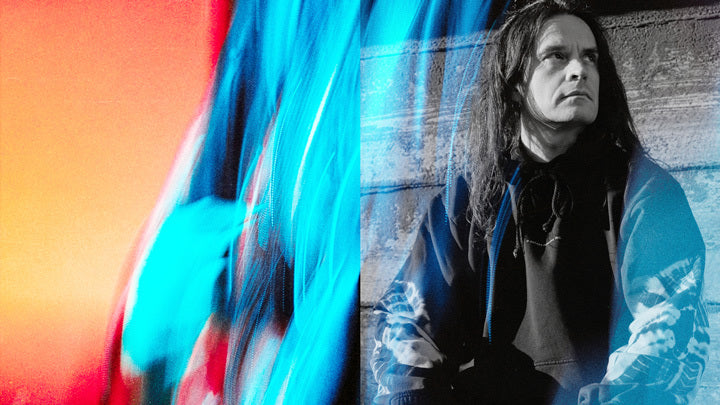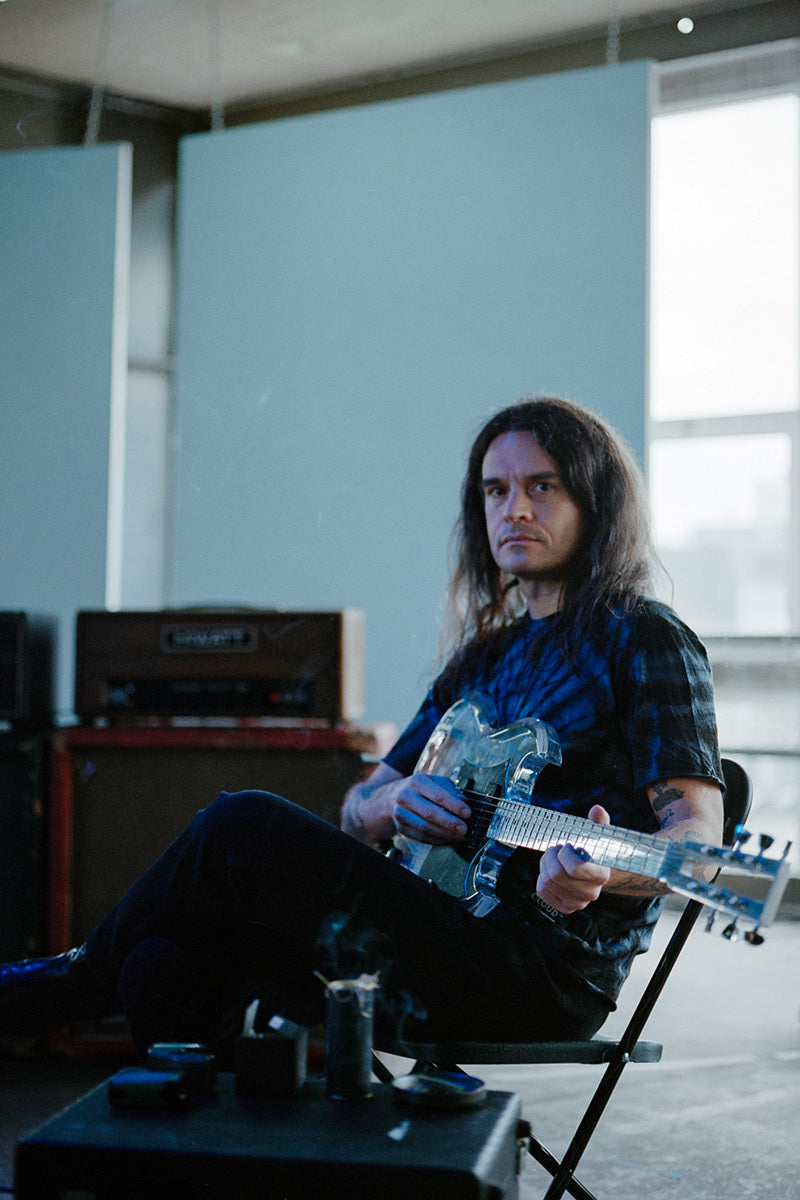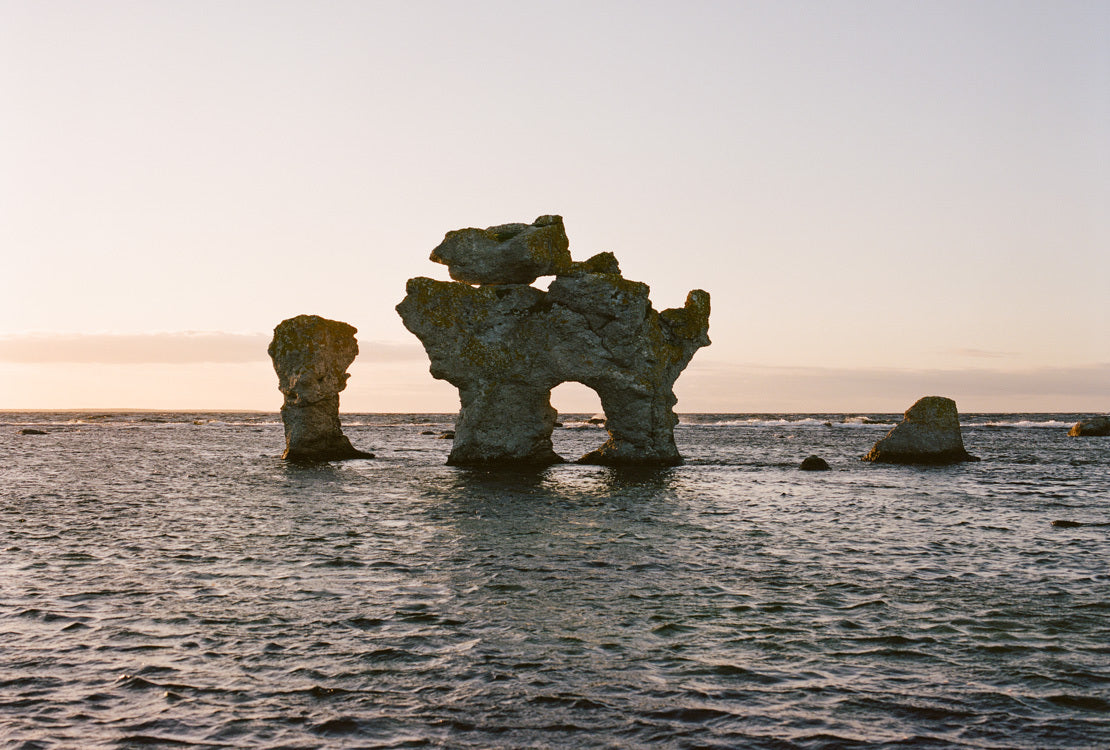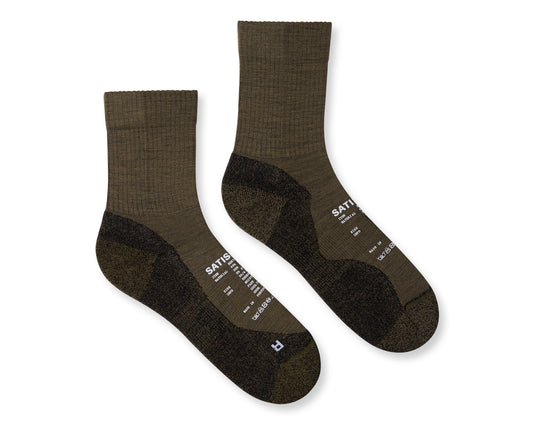
INNER TRIP CENTER

We sat down with composer & musician Stephen O’Malley (founding member of the band Sunn O))) ) to talk about the fundamental nature of our bond to the environment, how it influences his process in creating sound experienced as substance, and how running serves as a reminder and conduit for this ever-present connection.
1/ Does running in nature, or the environment in which you do it, produce a particular effect on you?
The environment always affects me, whether I’m running or not, but indeed being in nature is an enormously positive experience. I know that’s because I’ve been so depleted from regular, natural interaction—or interaction with nature—for so many years, living in cities and my lifestyle. But it’s beautiful because we remember that very quickly, there’s always that snap where you become again aware of the environment. Running today, I was suddenly able to see the waves and the stones in a way that made it clear why we were here shooting this. It’s not that you’re desynchronised, it’s just that your attention connects. In states that emerge with different practices of meditation. States which running practice does enter as well. It seems more dramatic when that occurs in nature. It’s also happening at any moment that awareness.

2/ Do these sounds and elements in nature that you interact with during a run, for instance, the rocks, waves, or the wind, influence your work with sounds?
Nature is profoundly influential. It’s beyond significant—it’s fundamental.
3/ It’s something that’s linked to your music?
It’s linked to everything, so, yeah. It’s just that we forget about it, but it always relates to everything. It remembers that you’re in this space all the time. Even if you’re in the middle of Shanghai, you’re still in the middle of nature in a certain way; you’re may not be aware you connect to your environment. Maybe we can talk about the environment rather than nature. I’ve been reading a lot about the specific vocabulary and how it distances people’s thought process from reality, specifically concerning environmental issues. Terminologies and words that objectify nature as “something else” that you come into and depart, which is not the case. It’s the world, of course. The natural experience could be a romantic experience. Or a frightening experience. Or an enriching, inspiring one. Or relaxing. It could be all these other things that objectify the experience, the effortless experience, of being aware of your environment and where you are, and that you’re a part of it. For me, being in nature—running, hiking, walking, watching the ocean—it always reminds me that we’re part of it. That’s influential of course. That’s the point.
 4/ How would you describe the kinds of experiences you lead, such as in Brussels (Kanal Centre Pompidou, his performance in the Inner Trip Center film)? Can you explain your vision of performance? Would you say it’s like a sound bath?
4/ How would you describe the kinds of experiences you lead, such as in Brussels (Kanal Centre Pompidou, his performance in the Inner Trip Center film)? Can you explain your vision of performance? Would you say it’s like a sound bath?
A sound bath is a term that I don’t consider. Well, I’m curious about what that means too, actually, let’s put it that way. Some years ago, I encountered that phrase and asked: “What is that?” Much music over the years has involved a very, very physical experience that you could say feels like you’re in liquid: the weight and the flow and pressure. Still, I understand sound bath to be a kind of genre of new-age type of music.
5/ Can you define the experience of your music then?
Usually, I’m not particularly eager to define it myself because the other people that do it have much more exciting things to say. But I can describe it in an environmental sense. We are working a lot with sound energy to remind ourselves we are part of the environment and our physicality connects to all of these different kinds of life. In the music, sound waves vibrating air, or matter, the body, the building, or the floor, the people around you. For me; it’s a reminder of this connection.
I describe the music as an experiment with the feedback of sound. There’s a generative sound process that starts and then it develops a life of its own feedbacking through a system developed with the people I work with, a lot of amplification, speakers, different effects and filters, and various types of instruments. Breaking it down further is more interesting, the more I go on playing music because it’s elementary and doesn’t require technical terminology. I mean, the technical side is fascinating, of course, for the people looking for those details. But I think in more simplified terms, it’s much clearer: sensation and ability of just being in the present moment and experiencing this possibility of the sound energy.
 6/ What’s your relationship like with music when you’re performing it? Is it an act of exploration or an act of control?
6/ What’s your relationship like with music when you’re performing it? Is it an act of exploration or an act of control?
It’s both, and I would say, actually—in varying degrees at different times.
Exploring because I am personally interested in having an experience of playing music that’s exciting and risky and surprising. Keeping a method that allows an unknown element of exploration, it continues to have that gratification for me, just on a personal level. Controlling the music is an exciting idea and can go into a lot of different conversations about composition and composers as well.
But what is music? From where does it originate? When you think that you’re allowing something to happen, you’re not in control. You’re admitting to yourself that it’s beyond your control or that control doesn’t exist. And with music, in my experience, it can be exhilarating to be immersed in that, riding it, being in those forces of energy or inertia or saturation or any adjective you want to put on what sound makes you think about, like a liquid, like being in the sea or being on a mountain.
7/ How do you think about music and sound concerning the things you encounter in your environment? For instance, how you described noticing the waves and stones in Fårö?
With music, typically the sensation of encountering a mass or structure of sound is foreign to a lot of people’s experience of what music can be or what music actually is or what sound is, even.
There are only certain situations where you are shaken to your core by sound energy. If you live in the city, maybe it happens more frequently, but you’ve probably normalised it because it’s just going to work in the morning and the subway pulling into your station, or some lorry trucks driving over the bridge next to your apartment or taking off in a plane.
In the sense that it’s creative energy? It’s useful to think about established vocabularies for this that are not about music to relate metaphors. And sculpture has been one set of language that’s useful. It removes the sort of violence from the experience of encountering sound energy as something out of your control and instead transforms that thought into something that’s about gracefulness, matter and mass perhaps. Those metaphors also apply to liquids, immersion. It’s encountering these massive forms that dwarf the human experience.

8/ But you mentioned at one point that your music could have more of an impact than what you might hear on the radio, for instance. In this sense, what effect do you think music has on people?
The impact music has on people is event-based impact, which also connects to an environmental experience perhaps, or in a natural setting—when you encounter the wind on the seashore violently, or the intense cold on a mountain, or the deep smell of the humidity in the forest. I hope that the music I’m involved with can have a tiny percentage of impact like that. If it does, then that pleases me a lot and hopefully, the person who has that experience, it pleases them too. Music is very different from being in a natural environment in that it’s abstract and subjective, thought to originate from someone’s mind at its source. In contrast, nature is justly profound; people can share those experiences more commonly.
 9/ Just as you think there is a relationship between sound and music, do you think there is a relationship between meditation and running?
9/ Just as you think there is a relationship between sound and music, do you think there is a relationship between meditation and running?
In my experience, there is a relationship between meditation, running and music. I’ve often thought about as being a grasp of “peak experience.” But actually, it’s not a grasp for an experience that is beyond the familiar. Instead, being in tune with where you are at the moment—and getting to that spot again and again.
With meditation, it’s self-evident. As I understand it, the centre of many meditation practices is to come back to the starting point, that’s the goal if there is a goal, and then there is no goal!
With running, there are many more layers of athletic performance to focus around. For me, it’s been a path of connection with the environment by spending time outdoors and spend time in my mind away from all the other distractions.
And indeed music has a certain intensity to it. My experience performing, “meditative” is the right word—it’s not meditation, but it has meditative aspects. Also, with the running, it’s not meditation, but it is meditative. The differences. The qualities of it. They’re other practices, but for me, they’re significant. They’re very, very connected. I’ve practised all three of them cumulatively for enough time to find the space in my life, and I find to be very beneficial.
10/ What is your definition of The High?
It’s changed a lot throughout my life, how I would describe that. And maybe that’s the answer that I should give: it’s not a singular thing, but it’s like an exploration of different states of consciousness. There’s a real high for me in being aware of what’s happening, and being more transparent in reality. It’s bizarre that it happens with my music because my music is involved with so many abstractions.
It’s a real, physical experience.
But all of that is always there when you’re in the woods, you know? I notice there are five types of trees here. They are already there.
 11/ You talk about sounds, songs, and music — and in the usage of that vocabulary is an implication of differentiation between them. So what would you say you play?
11/ You talk about sounds, songs, and music — and in the usage of that vocabulary is an implication of differentiation between them. So what would you say you play?
But the thing is it doesn’t matter what I say because it exists. I do it. I could say anything really because music is abstract. And then people, they want to believe in the story too, even if there is a straightforward story in the lyrics or its structure, then you can still say anything. I’ve experimented with this a lot with Sunn O))), and one of the central concepts of the band for me is a kind of conceptual art direction. To create a story around an abstract structure, not in necessarily a manipulative way or like PR, but people want to believe stories. That’s how the culture is made, by creating these structures and shared belief systems, which happens with music as well.
There are tools, or there are elements, in music that do remind of ancient archaic stories. Music has been around for millions of years of hominid and pre-hominid existence. Many of those keys relate to the natural experience. As the guitar solo, I think it’s a super arcane, archetypal experience, even if the sound itself of an Ace Tone Fuzz or whatever isn’t something new but distortion itself? Does that affect the human mind in a way? What is relative to that? Lightning? Fire? Do you know? Something that these super old, intense natural experiences of encountering nature in this very focused and rare event. I think things like the electric guitar and synthesis bring that to mind. Maybe not so much in the conscious mind but the full experiential sense. People want to believe stories. So I could talk about that, and someone would say, “Oh no wonder Jimi Hendrix is next to god,” you know? Because he’s doing this. Even if it’s just a rock solo.
But I think of that with all types of music too.
In the 17th century, new instruments that developed to create the symphony orchestra were super fresh sounding, but they also had a relationship to semi-familiar timbres reflected in nature, some of them. The freshness of sound, it’s still activating something that is a kind of memory process. We can initiate that all the time too.
That’s the kind of high I like, thinking about that. Or having those experiences, you know? Having those experiences of being aware enough that you feel alive and you feel life is so vivid and intense, that’s what interests me. Isn’t it the same for all of us?
12/ How would you describe your experience of the contrast between your music, which is loud and has much intensity, with running, which is in the quietude of the mind?
I spend much time in quiet. A lot. Most of the time. Of course, I listen to music and watch films and live in the city but I spend much time in quiet. Might seem paradoxical to some of the music I make because it’s this eruption. It’s very similar in some ways. There’s an intensity to that, and quiet is still a sound. It’s not like something is missing; it’s also space. So maybe they’re not opposites, but they’re from the same kind of family, you know? But I spend much time in the quiet.

13/ I remember a few years ago when I went to Iceland. I was shocked by the silence and the heaviness of the landscapes. It makes you feel truly alone. For the first time, I felt the loneliness of the explorer in new terrain. This sound of silence makes you feel more intimately about yourself than having a discussion with someone or being present in civilisation can elicit. And this is part of that too. What I experience when I run, I feel that I exist. I guess that when you’re on stage, you feel as though you live in this same way as well.
One of the mind-blowing things about meditation, in my experience, is when you get to this state, and that’s where you are—it’s you. And that’s what you got! That’s everything. So with running too, when you come to this space, it’s you experiencing all these things: moving through space, being aware of the environment, being high, achieving these things. However, you want to describe it. But you’re aware of yourself. And that’s all you have. You don’t need more than that.
I like that story about Iceland. I immediately recalled that I had a very similar experience when I went there. It also made me think, even with the silence, there’s immense gravity everywhere, the mountains and landscape. The weather systems are ultra-present, you know? There you are, in space. How do you end up in that space? Just paying attention to it is astonishing.
 14/ To continue in that vein, when you play your music—for instance when you play inside of a church that you don’t know—it’s also like exploring a new space. Do you have this same experience and feeling? Do you have an idea in advance of how the sound will be affected?
14/ To continue in that vein, when you play your music—for instance when you play inside of a church that you don’t know—it’s also like exploring a new space. Do you have this same experience and feeling? Do you have an idea in advance of how the sound will be affected?
The idea is rooted in experience. So, if I’ve played in similar spaces, then I will have a prediction. And sometimes fake the forecast too. Triangulate based on a few other things. But I try less and less to place something over top of it before actually experiencing it. It’s stimulating to explore that way.
Things can sound so different based on, of course, acoustics—that’s what sound is, it’s acoustics. The room shapes sound in very, very different particular ways, even if it’s the same source. Incredibly, buildings are designed specifically for that purpose. Temples, churches, for example, they’re primarily made to worship God, or whoever is a projection of the self into the cosmos. Buildings designed to amplify voices and light and to bring the mind into this other interior resonant space. And the fact that you can enter that now with something that is, in the present moment, contemporary music and access those tools, that’s exciting.
 15/ I feel like nature can be a mystical experience in a similar way as you say how a church can amplify your voice. I think nature can also amplify your mind.
15/ I feel like nature can be a mystical experience in a similar way as you say how a church can amplify your voice. I think nature can also amplify your mind.
I think so too. I think being in nature the mind doesn’t need to be amplified because it’s already there; it just needs to be attended. Not even focused, it just needs to be aware. Nature helps me become more aware of that aspect. Dramatically, sometimes. The strange part is when that feels like a psychedelic experience or a heightened different state of consciousness, but it’s not; it’s just the normal state of consciousness.
16/ Maybe you can define your music some more?
It exists. I know what you’re asking, in any case. But let’s make it more so you can find something in what we’ve been discussing.
17/ Maybe we can frame it this way: You can expand your mind, get high, have an experience with sound or music. But most of the people’s experience with music is like Spotify for most people, you know? We are the lucky ones because we get to see you perform it live. So I think the way to put it is like, not to explain but... If I am a runner or if I am into meditation, I know that I can get high with physical activity. But maybe I don’t know I can get into a meditative state through sound and music. And perhaps that’s the way you can tell this story, of how sound may elevate your mind?
I think my practice with sound and music involves much exploration of elasticity of time and the focus of being in a space. And that space opens up changes, in just a few degrees, where you experience something very, very different to the day to day experience. A state of consciousness that we can share with activities like the runner’s high, Zazen meditation, and various other types of meditation or meditative exercises. Sound is incredibly meditative. And why sound is central in ceremonial work, why it’s used by runners, to synchronise their experience of time. I think sound itself is a very powerful laboratory to actualise time’s subjectivity, that it’s nonlinear and is the same thing as space, about connecting and being aware of the environment.

18/ In a way, your music is like long-distance running. I like this idea of the elasticity of time, and long-distance running—it’s all about that you know?
There are many thresholds to pass with long-distance running, for sure. And also with durational music. I’m very interested in durational music and cyclic music. So-called minimalist music often deals with these aspects, but durational elements of music allow these seemingly difficult thresholds of experience to appear and overcome, and be overcome. But of course, once you overcome them, they have no gravity or substance anymore. They didn’t exist after that moment. And you see things very differently right after that, the moment you overcome those thresholds concerning time and endurance.
Both activities [running and music] are using raw matter, just primary material, resulting in the action of using that material, actually, more than creating something from that material. It’s experiencing the use of that material. The word “minimalism”—again, going back to vocabulary—can be quite complicated because of contemporary art history, primarily. But I think that using it more fundamentally, fundamental as the actual matter is a way to think about it. Sound—there’s so much there. It’s just a band of energy we always encounter that we perceive as this physical experience.






